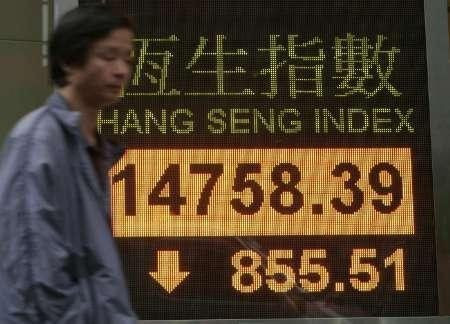Hang Seng on Mark to Book Best Jan. Since 1996

(REUTERS) -- Hong Kong shares rose on Tuesday with the Hang Seng Index streaking to its best January since 1996, but further upside is expected to be capped going into earnings season after several profit warnings from mainland companies.
Mainland Chinese markets were also firmer, with the Shanghai Composite Index edging up 0.3 percent after a volatile session in which A-share turnover neared January lows.
The China Enterprises Index of the top mainland listings in Hong Kong rose 1.4 percent. The broader Hang Seng Index was up 1.1 percent at 20,390.5, with near-term resistance seen at its 200-day moving average at about 20,586.
Month-end window dressing gave Hong Kong turnover a 30 percent boost on Tuesday, which was fairly robust, increasing for a second-straight session, traders said.
For the month, the Hang Seng Index gained 10.6 percent while the China Enterprises Index jumped 13.7 percent, ranking them among the best performers in Asia. Both benchmarks were among Asia's worst in 2011, slumping about 20 percent each.
Profit warnings from a slew of Chinese material and power companies tempered gains. Angang Steel Co Ltd bled 10.9 percent in Hong Kong and 4.4 percent in Shenzhen after it forecast a net loss of 2.2 billion yuan ($347 million) for 2011.
We can probably expect several more profit warnings ahead because of economic conditions last year, Alex Wong, Ample Finance Group's director of asset management, told Reuters.
Expectations are key, Wong added. We could see analyst downgrades following full-year earnings, but with some people expecting 2012 to improve over 2011, mainly on a recovery in the second half, I don't expect the pullback will be too dramatic.
China Mobile Ltd, the mainland's biggest mobile phone operator and a popular defensive play, was the Hang Seng Index's top boost, gained 2.3 percent on Tuesday to hit a four-month high.
Apple Inc may add China Telecom Corp Ltd and China Mobile as iPhone distributors over the next year, Morgan Stanley said in a note late on Monday.
Tencent Holdings Ltd gained 2.9 percent, extending gains on the back of Facebook's impending initial public offering, which is seen as a possible indicator of strong investor appetites for the Chinese internet sector.
SHANGHAI COMPOSITE FIRMLY CAPPED AT 2,300 LID
On Tuesday, the Shanghai Composite Index finished at 2,292.6 points, stymied once again by the critical 2,300-2,320 chart resistance that provided support on at least three occasions since July 2010 until that support was broken in mid-December.
Energy stocks such as PetroChina Co Ltd and China Petroleum & Chemical Corp (Sinopec) were the top boosts to the benchmark, up 0.8 each. Leading coal producer China Shenhua Energy Co Ltd gained 0.6 percent.
The Shanghai Composite Index gained 4.2 percent in January, ranking it among the worst in Asia. Monthly trading volume in Shanghai hit the lowest since October 2008 ,with mainland investors wary of coming back into the market after losses in 2010 and 2011 slashed 33 percent off the index.
Market watchers said greater clarity on the extent of the slowdown in the world's second-largest economy could boost confidence, as would monetary policy easing and more institutional investment in a market dominated by retail investors and largely closed to foreigners.
Beijing is scheduled to report January manufacturing data on Wednesday that may point to a sluggish start to 2012, with a Reuters poll suggesting official purchasing managers' index (PMI) will come in at 49.5, after a slight upturn in December.
In a sign of the adverse market conditions despite the Shanghai's first monthly gain in three, China Communications Construction Co Ltd, the country's largest builder of ports, slashed its initial public offering by 75 percent.
It has a lot to do with market conditions right now. That the company chose to launch its IPO despite the adverse conditions suggests it could be quite urgently seeking extra funds, which makes it even more unattractive, said Chen Yi, an analyst with Xiangcai Securities in Shanghai.
Mainland initial public offerings are typically priced at a premium over their overseas counterparts, with the companies' valuations inflated as a result of limited supply due to stringent government approval procedures.
That could soon change, with China's securities regulator reportedly studying measures to allow market forces to play a bigger role in IPOs, responding to Premier Wen Jiaobao's call for further liberalisation of the current system, according to the official Shanghai Securities News.
© Copyright Thomson Reuters 2024. All rights reserved.






















